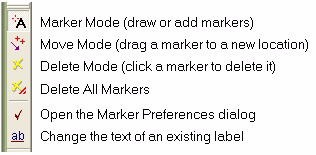![]() Labeling
Images
Labeling
Images
Labeling refers to drawing text and markers on a displayed image. The displayed labels can be copied with the image for use in graphics arts software or other applications. Adding labels uses the Label Toolbar, which is a standard Command Toolbar. The toolbar opens with Marking Mode active.

Activate the Label command: Use the Measure >
Label menu command or click the ![]() button.
button.
Be sure the drawing preferences are set as
desired. If not, click ![]() to set them.
to set them.
Be sure you are in Marking Mode (the mouse
pointer will recapitulate the ![]() button).
If not, click
button).
If not, click ![]() to activate Marking
Mode.
to activate Marking
Mode.
To Add labels,
![]() Move the
mouse pointer to the place where you want to create a label and
click the mouse. The Change Label Text Dialog opens to request text for
the label.
Move the
mouse pointer to the place where you want to create a label and
click the mouse. The Change Label Text Dialog opens to request text for
the label.
![]() Enter the
label's text into the edit field. Click [OK] to close the dialog and add the label to the
image.
Enter the
label's text into the edit field. Click [OK] to close the dialog and add the label to the
image.
To Change the text of an existing label, click
the ![]() button on the Label
Toolbar.
button on the Label
Toolbar.
To Delete any label, do one of the following:
![]() Enter
Delete mode by clicking
Enter
Delete mode by clicking ![]() . Then click the mouse on each label you want to
delete, or
. Then click the mouse on each label you want to
delete, or
![]() Hold down
[Shift] while in Add mode and click the mouse on each label you
want to delete.
Hold down
[Shift] while in Add mode and click the mouse on each label you
want to delete.
Labels are a non-permanent overlay of the displayed image. In other words, they do not stay with the image data when you save the file. After you have marked labels on an image, you can copy the screen bitmap to the Windows clipboard using the Edit > Copy command in the Image window's pull-down menu, then paste into other software using Edit > Paste.
To set label preferences, click ![]() on the toolbar to open the Label Preferences
dialog.
on the toolbar to open the Label Preferences
dialog.
Examples of Labeling Images shows the detailed procedure of marking labels on an image.
Label Preferences dialog, Label Text dialog, Examples of Labeling Images, Image Windows